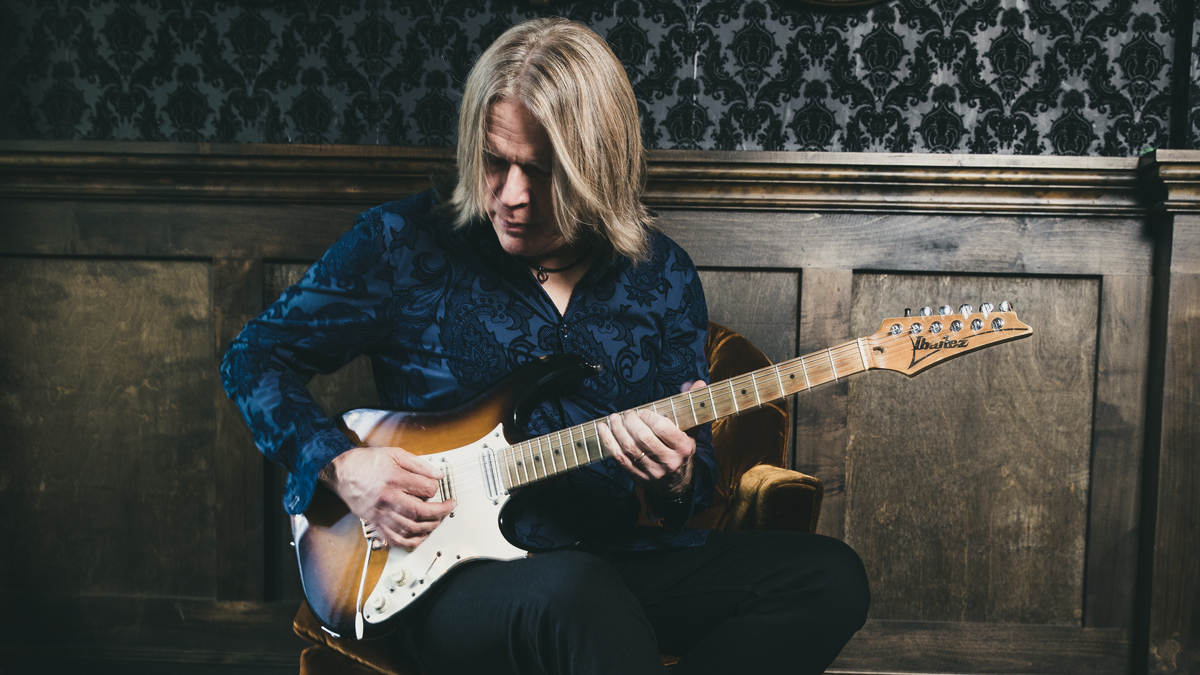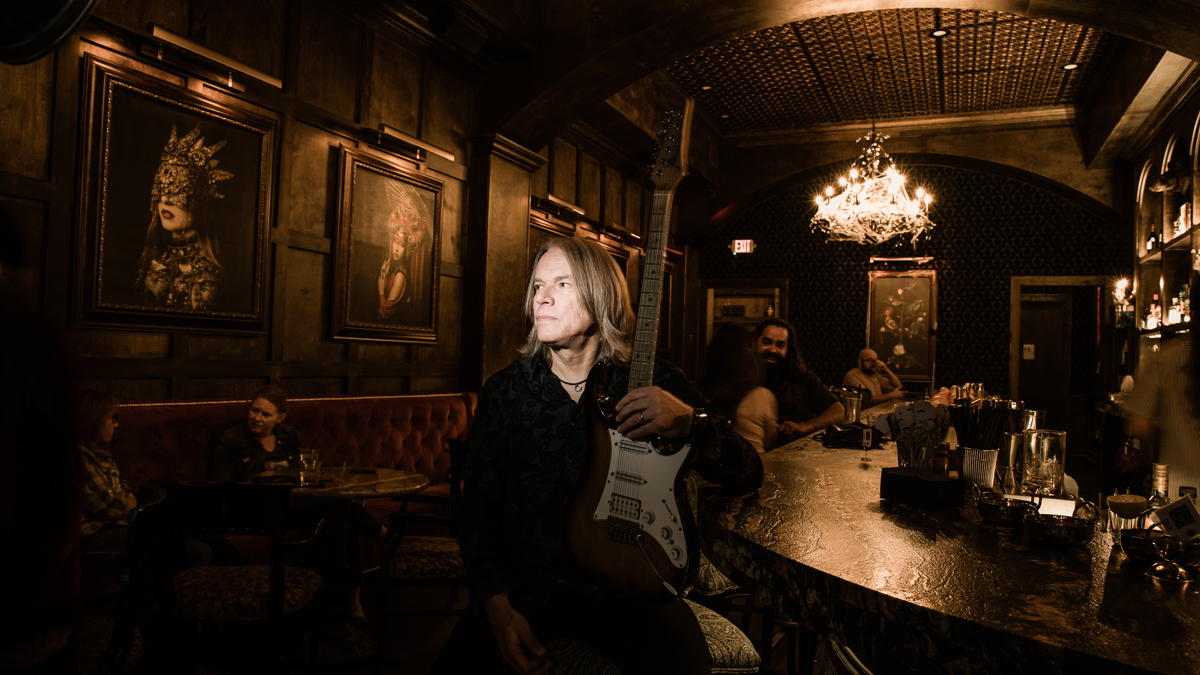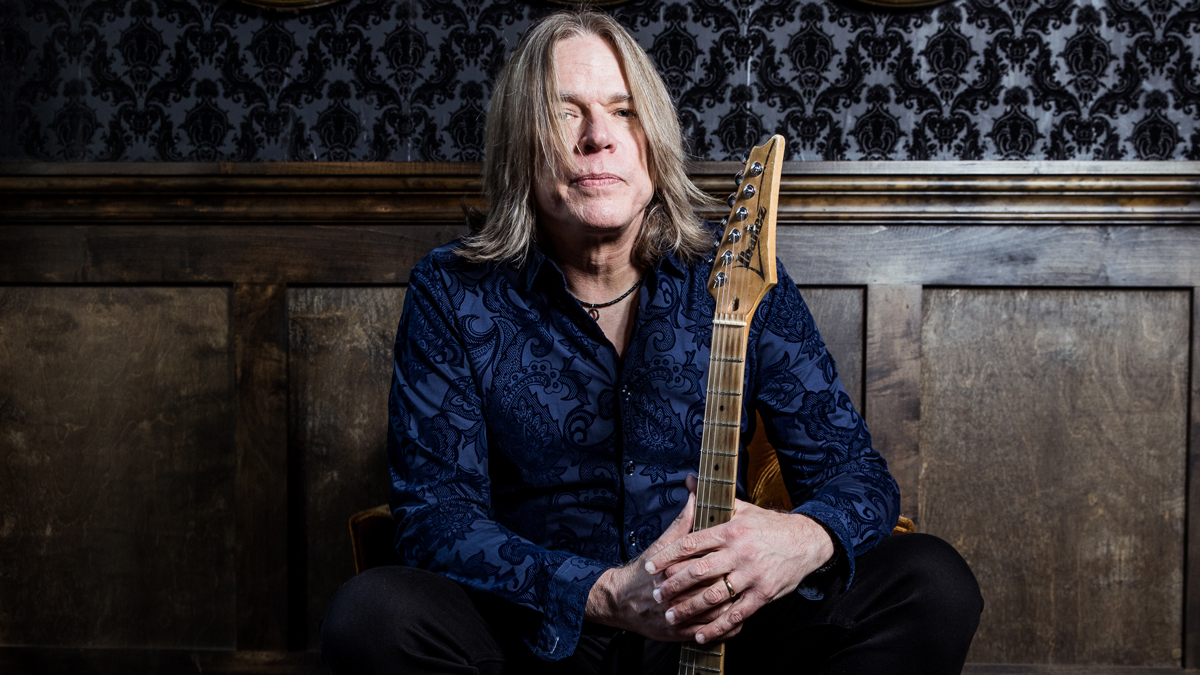Andy Timmons opens up on mental health: “The guitar and music have always been catharsis for me. I can't imagine life without them”
The virtuoso shares his struggles with depression, alcohol and tinnitus – and how a lifelong love of guitar playing and music helped him through it all

This article is part of GuitarWorld.com's series of interviews and features with artists addressing and raising awareness around themes of mental health, particularly as they relate to musicians.
“A couple of girls came up to me in fifth grade, maybe I seemed down or I was reacting to something, and one of them said, ‘Why do you take things so seriously?’ I remember that moment, because I was shy and withdrawn, and I would have quiet periods when I was down, for whatever reason. I wouldn't have recognized it as depression at that age. It was sadness, and I dealt with it and never spoke to anybody about it. It was just, ‘This is me and my life.’ But it was apparent to me at that point that other people were recognizing that I was sensitive.
“My parents split when I was 5, and I don't have much memory of Dad being around in the household. We had a lifelong relationship, ending up living in the same town, and we would all get together, but there was a period in my life when I wondered whether not having my mother and father together affected my insecurity. I was the youngest of four boys and I spent a lot of time alone, because Mom worked to support us. Like so many superhero moms, she did what she had to do for her kids, and that meant working full-time and the kids being on their own a lot.
“My brothers looked after me in my younger years, and in a sense they were my father figures. They were my heroes. We were all four years apart, so Bryan was four years older than me, John is eight years older, and Mark is 12 years older. My love of music is because they were all avid music fans and amateur guitar players. That certainly led to my career in music, no doubt about it. So they were the big male influences in my life, and Mom influenced my work ethic.
“We lost Bryan in 2007 to depression and alcoholism. I wish I could have helped him more, but I didn’t know he had an alcohol problem until a year before he died. He hid it. Looking back, there were signs, and I think, ‘What a fool I was not to recognize it,’ but by the time I found out, his addiction had been going on for years. I went home and I was going to ‘rescue’ him. People who had lost family members to addiction told me, ‘You can’t do this for him. He has to want to do it,’ but I didn’t accept that. I thought I could keep him safe. And he did great for a while, but eventually he relapsed and passed away. I always wonder, if we had grown up in a family where these things were discussed, would he still be here? Would he have had a chance to get through it? I don’t know.
“As a kid, I had my guitar, my record player, KISS, the Beatles, and rock and roll. That was my foundation and my solace. I had nobody to talk to about emotional stuff that was happening at the time, so music was my safe space. It still is. When I have my music, everything else goes away. If it's a dark time, when I'm listening to Chopin or the Beach Boys or things that make me cry, it's a catharsis. That’s what the guitar and music have always been for me. I can't imagine life without it. It's a soul-nurturing thing that connects us in a real way. John Lennon writing There’s A Place, Brian Wilson writing In My Room – those songs resonated with me. I’m welling up just talking about them.

“My family, in general, never discussed anything emotional. Everything was ‘rose-colored glasses’. My mom was clearly struggling to do the best she could, working so hard and dealing with all that, and yet she very rarely complained. It was nose to the grindstone and everything's fine. That’s how it was in those times. But, as we know, the longer things are internalized, the deeper the issues become.
All the latest guitar news, interviews, lessons, reviews, deals and more, direct to your inbox!
“I’m old enough to come from generations that didn't speak about emotional issues or problems, because that would be admitting weakness. Or at least that's the stigma. Now, as an adult, I don't consider it weakness to talk about these things. I consider it being human, being real, and being honest. So many people are suffering, and we’ve got to share these very common and very human traits so that we all know that we're not alone. Many years later, I found out that a lot of people in my family were struggling with those very same issues that we never talked about. I had never known.
After all that energy and exposure on tour, you go home, sit in your basement apartment, and wonder, ‘What do I do today?’ That’s when I would go into pretty serious depressions
“I can't say there was a moment when I recognized that I was depressed. It was just a gradual understanding that I go through periods of time where I don't want to speak to anybody and I cut myself off. When I look back at my years with Danger Danger, which was from 1989 to 1993, we were just successful enough to know to a small degree what famous celebrities must go through. We didn't sell millions of records, and we were able to go out in public, but we were on MTV quite a bit for a couple of years and we would get recognized. When you’re on tour, you’re in a different city every day, girls are coming at you from all angles, fans want autographs, and you're onstage in front of thousands of people every night. Then, after all that energy and exposure, you go home, sit in your basement apartment, and wonder, ‘What do I do today?’ That’s when I would go into pretty serious depressions.
“I got to the point where I did seek help. I moved back to Texas after Danger Danger broke up, and I saw a psychologist. He helped me talk through the depression I was experiencing. I wasn't even aware that it was because this major part of my life had just ended, and of course there was going to be a mourning period.
“Fast-forward to 2011, and it was clear that I needed real help, because I was in a deep hole and I didn't know if I was going to get out of it. I've had tinnitus for a large part of my career, but I also developed a condition called hyperacusis, which is sensitivity to sound. It got so bad that I no longer enjoyed music and I couldn't play. In order to perform, I had to put swimmer's wax in my ears to seal them off. It was painful.
“I was always a sensitive, emotional kid – I still call myself a kid – whose identity is based on his ability to play music. That's my life's passion. That's what I'm known for. When that was taken away, I went into a very deep depression. I didn't know if I was going to get past the hearing issues, my whole life's work was at a precipice, and I wasn’t sure if I would ever be able to do this again. If I can’t play guitar, who am I? What am I going to do?

“It was an extremely dark time. I never was suicidal, but there were thoughts, for instance if I was getting on a plane, of ‘I wouldn’t mind if this thing hit something hard.’ I wasn't wishing harm on anybody else, of course, but my drive for staying alive was at a low point. But I knew I had to get through this for my son, Alex, who was then 7 years old. I was 48, I had no regrets, and I’d had a good life, so for no other reason than Alex, I knew I needed to be here. I didn't want him to be without his father. I couldn’t do that to him.
“There was also a level of addiction happening at the time. I was suffering from back issues, and while I tend to be anxious in general, I had developed severe anxiety about flying. I was prescribed pain medication for my back and anti-anxiety medication for travel. I was in Southeast Asia and Europe all the time, so I had medication to help me sleep. And of course you need to come down after the gig, so I drank. The hyperacusis was on fire, and mentally I was at my lowest. I came home, went to my general practitioner who had prescribed all these drugs, and slowly and painfully I quit.
Life presents us a lot of stuff that we have every right to be devastated or depressed by. There are so many contributing factors to everyone’s situation
“The alcohol wasn't hard to stop. It was the alprazolam. I had to wean off of it, and that was really hard. Through finding a really good psychiatrist, who put me on an antidepressant that I’m still on, an amazing psychologist who helped me identify and address the issues, and an equally amazing audio specialist, I got through that period, as my friend Olivia Newton-John used to say, ‘stronger than before’. Audio therapy helped with the tinnitus, and the hyperacusis went away.
“I’ve never really talked about my mental health issues because it never came up. No-one presented the opportunity, nor did I have the desire to reveal it. I did the C.A.L.M. video because I met the Peace Pirates at a NAMM show. They’re an amazing group from England that I became friends with, and when they asked me to do it, I was more than happy to contribute. I don’t think they knew my history, but I was happy to help with the cause.
“The subject came up once during one of my masterclasses at a guitar camp. I spoke at length about the hearing issues and talked about depression, because I was afforded the opportunity and a place where I felt comfortable to talk about it. When this [GuitarWorld.com] interview was presented to me, I needed a moment to think, ‘How much do I want to share in a public venue?’ I remembered the positive feedback from that one masterclass, emails I received saying, ‘I appreciate you talking about it, because I struggle with depression, and it helps to know that somebody like you’ – meaning they know me through my music – ‘is also going through stuff.’
“I know that I’ve been fortunate in so many ways. I have a home, I work hard, I can support my family. A lot of people don’t have those things. I met my wife in 1994, we married in 1996, and she has been through all of this with me. We’re doing really great. So I think this is a good time in my life and career to talk about it. I think people naturally protect themselves to a certain degree, but the last thing I want to be is artificial in my life, my music, and my interviews.
“There’s such a stigma around mental health, but I think it’s becoming a little less. You see it now in public service statements from athletes and others who are becoming more open about it, even though they may be attacked for revealing these things, or they may be considered weak or soft. I think that’s just the saddest thing, because I know how strong a person I am to have gotten this far in my life.
There was always a sense that ‘I’ve got to be able to do this and this and this’ that I saw all these other great players doing. That’s extremely unrealistic pressure to put on yourself
“I’m a very strong person but also a very vulnerable one, especially when it comes to a highly sensitive subject like the one we’re discussing. Hopefully, my vulnerability can help even one person come away from this interview realizing that they can get help, that it’s okay to do so, that they’re not weak, they’re not a horrible, sad person, but instead they’re a normal, functioning, sensitive human being, and that life presents us a lot of stuff that we have every right to be devastated or depressed by. There are so many contributing factors to everyone’s situation, and we need to be sensitive to that.
“It’s the same way with guitar playing. No matter what level any of us get to, there’s always so much out there that can intimidate you, humble you, or hopefully inspire you. It took me a long time in my career to get to a place where I could be comfortable being me. There was always a sense that ‘I’ve got to be able to do this and this and this’ that I saw all these other great players doing. That’s extremely unrealistic pressure to put on yourself.
“It’s important to grow, but also to accept that ‘I can’t be this other great musician that I admire so much, but I can honor whatever abilities I have and work hard at being the best me that I can be.’ That sounds like a trite and simple thing to say, but it has taken me a lifetime to get there and it’s still hard. There’s still that part of me that’s insecure. I even felt it before this interview. I had to ask myself, ‘Why am I being insecure about speaking about myself?’
“All that to say that this hasn’t been talked about a lot because I’ve been protecting myself, and it had to be the right platform. I watched an interview with Steve Vai, where he was speaking about ego and humility and confidence versus when you’re getting beaten down and criticized. Steve is a very intellectual and soulful being, and he spoke so beautifully about the subject. In my insecurity and sensitivity, I thought, ‘I’ll never be able to speak that way. What am I possibly going to say in this interview that will be meaningful?’ I had to let go of that and say, ‘I’m just going to be me.’ So I appreciate the opportunity to do that, and I hope I’ve had something to add to the conversation.”
As told to Alison Richter
Mental health resources
Alison Richter is a seasoned journalist who interviews musicians, producers, engineers, and other industry professionals, and covers mental health issues for GuitarWorld.com. Writing credits include a wide range of publications, including GuitarWorld.com, MusicRadar.com, Bass Player, TNAG Connoisseur, Reverb, Music Industry News, Acoustic, Drummer, Guitar.com, Gearphoria, She Shreds, Guitar Girl, and Collectible Guitar.
![B.B. King [left] cups his hands to his ear as he asks the crowd for more. Joe Bonamassa, with a Les Paul, gives his crowd a thumbs up](https://cdn.mos.cms.futurecdn.net/P3XrQLh86C27JfPp4AGp6n.jpg)